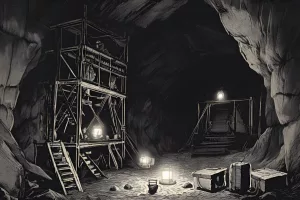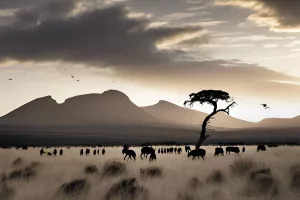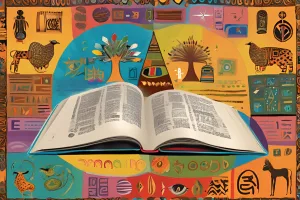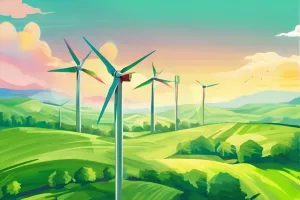In Sandton, the Red Bull Showrun Joburg set the stage ablaze with excitement, as fans cheered for the roar of the legendary RB7 racing car. This thrilling event not only showcased the speed and skill of Formula One but also reignited hopes for a Grand Prix in South Africa. With the beautiful sound of the car harmonizing with the national anthem, the crowd felt a deep connection to their country’s motorsport history. The push for a Grand Prix holds the promise of cultural exchange and economic growth, making South Africa ready to shine on the global racing map once again. As the engines revved, so did dreams of a bright future in motorsports!
South Africa’s mining industry is rich in resources but faces big challenges, especially after the tragic accident at the Impala Platinum Mine, which took 13 lives. This event highlighted serious safety problems and the need for better rules and technology to protect workers. Illegal mining also complicates matters, causing safety risks and harming the environment. To move forward, the industry must embrace innovation, improve safety measures, and work together with local communities to create a safer and more sustainable future for everyone involved.
Ray McCauley was a shining light in South Africa, known for transforming lives through his leadership at Rhema Bible Church. He began as a bodybuilder, winning the Mr. South Africa title, but later dedicated his life to bringing people together and promoting hope during tough times. His church grew from just 13 members to thousands, becoming a place of unity and acceptance for everyone. Even after his passing, McCauley’s spirit of compassion and his fight for equality continue to inspire many, leaving a legacy that will never fade.
South Africa is launching a new twopot retirement system on September 1, 2024, designed to help people balance their immediate financial needs with their future savings. This system splits retirement savings into two parts: onethird can be accessed before retirement, while twothirds is saved for later. While it offers flexibility for urgent expenses, many people are withdrawing money early, which raises concerns about their longterm financial security. Despite these challenges, there is hope that this system can strengthen the economy by encouraging people to think carefully about their financial choices. Overall, it aims to empower citizens while protecting their futures.
South Africa’s PowerBall is a thrilling lottery game where players pick five numbers from 1 to 50 and a special ‘PowerBall’ from 1 to 20. Draws happen every Tuesday and Friday, bringing excitement and hope to many as they watch the numbers flash on screens. This lottery isn’t just about winning money; it connects people from all walks of life, sparking dreams of a brighter future. With the addition of PowerBall Plus, players have even more chances to win, all while enjoying the thrill of the game through easy digital access. Ultimately, PowerBall symbolizes hope and collective aspiration, making it a vital part of South African culture.
The Employment Standards Conference in South Africa was a lively event focused on improving workers’ rights. Minister Nomakhosazana Meth proudly shared successes like the National Minimum Wage Act, which has lifted millions out of poverty. She announced a bold plan to bring in 20,000 interns to help enforce labor laws, emphasizing the importance of fair work conditions for everyone. The conference underscored a strong commitment to social justice, with leaders and labor inspectors uniting to tackle ongoing challenges in the labor market. With a shared vision for the future, the focus remains on creating a fairer workplace for all South Africans.
The Department of Home Affairs in South Africa plays a crucial role in the country’s governance by managing visas, permits, and fighting corruption. Their efforts to reduce backlogs in visa processing help bring skilled workers into the economy, boosting growth and development. The department also works hard to ensure fairness and security, with an anticorruption unit tackling illegal activities. Additionally, they are focused on addressing humanitarian issues, such as improving conditions for refugees, while embracing technology to make processes more efficient. Overall, their work reflects a commitment to progress, accountability, and the wellbeing of all South Africans.
In South Africa, healthcare costs are climbing rapidly, creating a tough situation for many, especially elderly citizens. Major medical aid providers, like Discovery and Bonitas, plan significant hikes in contributions for 2025, adding financial pressure to those already struggling. While the economy shows signs of growth, such as rising salaries, it’s not keeping up with the soaring medical expenses. This leaves many people facing hard choices about their healthcare options. As the nation moves forward, finding a way to make healthcare affordable for everyone is more important than ever.
South Africa is boldly stepping into the future with artificial intelligence (AI) to improve its economy and society. The country has set up important institutions like the AI Institute and the Centre for Artificial Intelligence Research that focus on using AI to solve local problems and drive innovation. At the recent SATNAC conference, leaders emphasized the need for ethical AI that respects people’s rights and promotes inclusivity. With a spirit of teamwork and creativity, South Africa is ready to harness AI’s power, ensuring that it benefits everyone as they build a brighter, techdriven future together.
In Tshwane, political tensions are rising as the Democratic Alliance (DA) faces serious accusations from ActionSA. They claim that the DA is giving better services to white residents, leaving many in townships behind. Former mayor Randall Williams has pointed out a huge gap, with suburbs seeing 64% service progress compared to just 24% in townships. As the city prepares for new leadership elections, these allegations are sparking debates about fairness and equality in South Africa, highlighting the deeprooted issues that still affect communities today.
In South Africa, a heated debate is brewing over the National Minimum Wage (NMW). The Democratic Alliance (DA) worries that raising wages could lead to more job losses, especially for young and lowskilled workers. On the other side, COSATU pushes for a wage increase to fight poverty and make life fairer for workers. This clash reflects deep economic struggles and a long history of inequality, making the future of wages a critical issue for many people in the country.
A man in the Western Cape was sentenced to six years in prison and fined R100,000 for illegally trafficking 56 protected animals, including dangerous snakes. This case shows the serious problem of wildlife crime and how it stretches across the globe. Authorities discovered these animals at his home, highlighting his illegal activities and connections to international traffickers. Efforts are now being made to return endangered species to their home in China, emphasizing the need for teamwork in protecting our planet’s wildlife. This victory is a strong reminder that everyone must work together to stop wildlife crime and save our precious nature.
Paving the Path to Prosperity: Deputy President Mashatile’s Blueprint for South Africa’s Economic Revival
Deputy President Mashatile has a bold plan to boost South Africa’s economy by improving energy reliability, transportation, and creating a better environment for businesses. He’s encouraging private companies to help produce electricity and is working on important reforms in rail and logistics to make trade easier. Recently, he met with international investors in London to showcase South Africa’s potential and strengthen global partnerships. With a focus on stability and collaboration, Mashatile’s vision aims to attract investment and pave the way for a brighter economic future for the country.
The BELA Act, recently signed by President Ramaphosa, has stirred up a storm in South Africa. Critics worry it could harm mothertongue education, especially for Afrikaans speakers, which is vital for preserving their cultural identity. Groups like AfriForum are raising alarms, fearing that the Act might lead to cultural loss. In response to the backlash, the President has paused some parts of the law to allow for more discussion. This ongoing debate highlights the importance of language and culture in shaping South Africa’s identity.
The Johannesburg Mining Indaba is a vital event for South Africa’s mining industry, bringing together leaders to discuss the future. This year, Minister Gwede Mantashe highlighted how mining is key to job creation and economic growth. With challenges like job losses and decreasing mineral production, the government is focusing on improving energy and infrastructure. They aim to diversify minerals, especially in new energy technologies, while also encouraging investment and supporting small miners. These efforts will help secure a brighter future for both the mining sector and the country.
South Africa is stepping boldly into a bright future powered by renewable energy. At a recent seminar in Johannesburg, Deputy Minister Samantha GrahamMaré shared a message of hope as she addressed plans to boost energy and create jobs through partnerships with Independent Power Producers. With over 12 gigawatts of renewable energy on the horizon, the nation is overcoming challenges like power outages and fostering economic growth. The event marked a significant moment in the country’s journey, highlighting the collaboration needed to unlock a sustainable and prosperous energy landscape. South Africa is ready to embrace a new dawn in energy innovation!
















